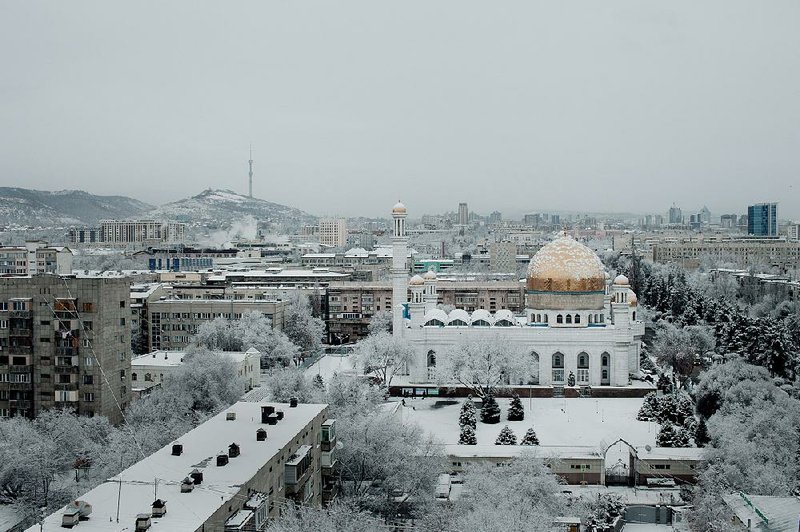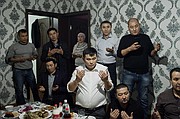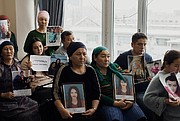ALMATY, Kazakhstan -- The businesses he started had failed, and he had a wife and two children to support. So when authorities in China's far western Xinjiang region offered him a job with the auxiliary police, Baimurat welcomed the good pay and benefits.
For months, he stood at roadside checkpoints, looking for people on the government's blacklist, usually from Muslim ethnic minorities. As a Kazakh Muslim himself, he sometimes felt uncomfortable about his work, but he needed the money.
Then he was asked to help bring 600 handcuffed people to a new facility -- and was stunned by what he saw. Officials called it a job training center, but it was basically a prison, with toilets and beds behind bars. One detainee was an acquaintance he barely recognized because he had lost so much weight.
Baimurat, 39, suppressed his emotions.
"There are cameras everywhere," he recalled, "and if they see you look unhappy, you will be in trouble."
The Chinese government has detained as many as 1 million ethnic Uighurs, Kazakhs and other Muslim minorities in a network of indoctrination camps across Xinjiang, provoking international condemnation. In doing so, it has vastly expanded the security apparatus in the sprawling, strategically important region on China's western frontier.
This rapid buildup has relied in large part on recruitment of officers from the same ethnic minorities that authorities have targeted, dividing communities and families while forcing people like Baimurat to confront difficult choices.
In a series of recent interviews in Kazakhstan, where he and his family fled last year, Baimurat offered a rare, firsthand glimpse into the workings of Xinjiang's security forces -- and the dilemmas that many employed by them grapple with daily.
Baimurat, who goes by only one name, said he had decided to speak out because he regretted working for police in Qitai county outside Urumqi, the regional capital. He also described how close he came to ending up in a camp himself.
"I feel an obligation because I have seen so many people suffering in the camps," he said.
Hua Chunying, a Foreign Ministry spokesman, confirmed Baimurat worked in security in Qitai in the months he specified. But she said he was employed by a shopping center, not police, and accused him of "all these lies."
In several interviews, though, Baimurat's description of his experience has remained consistent, with details that match those in police recruitment notices and the accounts of former camp detainees. Auxiliary police in China are sometimes hired through private contractors who give police agencies more flexibility to add and reduce staff.
Since going public last month, Baimurat has received anonymous telephone calls warning that his relatives in China would be placed into camps if he did not recant, said Serikzhan Bilash, an activist who helps ethnic Kazakhs from Xinjiang.
Baimurat immigrated to Kazakhstan in 2009, but returned to Xinjiang a few years later, to be closer to family. After businesses he opened selling fruit and horse meat, a Kazakh specialty, failed, he joined the police in 2017, he said, earning a good salary -- about $700 a month and decent benefits.
His tasks included examining travelers' vehicles and IDs at police checkpoints on major roads. He focused on people on government watch lists, searching their mobile phones for content considered subversive.
In particular, officers were told to look for images of the deadly ethnic riots in Urumqi in 2009, Baimurat said.
Authorities responded to that rioting with a security crackdown, which intensified after deadly attacks in 2013 and 2014 were blamed on Uighur separatists who embrace radical Islam. The government appointed a new regional leader in 2016 who tightened controls and blanketed Xinjiang with surveillance.
That was when recruitment of auxiliary officers like Baimurat took off, according to James Leibold of La Trobe University in Australia and Adrian Zenz of the European School of Culture and Theology in Germany.
By 2017, Xinjiang's police force was more than five times the size it had been a decade earlier, according to a forthcoming paper by Zenz and Leibold. The government recruited ethnic minorities in particular, part of an effort to address simmering grievances by providing jobs.
Decades of migration by Han, China's dominant ethnic group, have transformed Xinjiang, fueling Uighur anxieties. Uighurs, once the majority, are 46 percent of the region's 22 people million people, Han are 40 percent and Kazakhs 7 percent, according to government estimates.
The Chinese government has hoped that economic development in the resource-rich region would ease tensions. But many Uighurs and Kazakhs complain they have been left out of growth and face discrimination in hiring, along with stifling restrictions on their practice of Islam, their cultures and their languages.
Within the police force, Baimurat said, officers like him were scrutinized for signs of political disloyalty.
He said he was required to attend regular political indoctrination meetings and memorize quotes by China's president, Xi Jinping. Minority officers were prohibited from speaking anything but Chinese with each other, he added, and were punished if a word of Kazakh or Uighur slipped out.
The worst experience, he said, was taking people to the internment camp.
The government presents the camps as part of a vocational training campaign that steers Muslims away from religious extremism and has halted violence. Former inmates, however, say authorities hold people without charge and force them to renounce their religious beliefs.
Baimurat decided he had to get out. But he and his family had handed in their Kazakh passports when they returned to China in 2013. They were trapped.
"I was so scared that my legs were trembling," he recalled.
Eventually, a contact in another part of China, who could call Kazakhstan without drawing attention, was able to get Kazakh officials to provide temporary travel documents, he said.
At the border, police questioned his family, including his young children, for hours before letting them through. Back on Kazakh soil, Baimurat knelt down in thanks.
"We were so happy," he said. "It was like we had come out of hell."
Religion on 03/09/2019


